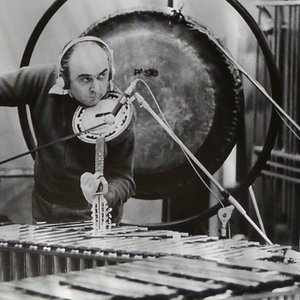Smokey, urbane, disarmingly complex and sophisticated, Egisto Macchi’s ‘Città Notte’ is indeed a rare and sublime jewel, even in the admittedly rarefied cosmology of Library/Production music.
Quite simply, ‘Città Notte’ sounds like no other extant recording.
Its heady melange of cosmopolitan folk guitar tropes situated with abstract sonic gestures, honking sideways trumpet (for all the world sounding like Macchi’s dear friend Ennio Morricone guesting uncredited on the session), scattering percussion and ominous VCS3 drones exists in a discographic universe all of its own.
Preserved to this day, Macchi’s ‘Città Notte’ notation and copious score notes reinforce the truth your ears bring to you – every moment is considered and sculpted, every strike and pluck measured and constructed as part of the whole. Dense, intellectual at times but with considerable charm and engagement, ‘Città Notte’ paints a metropolitan portrait in hushed lamplight and vibrant chiaroscuro.
Contained within a wealth of documents, artworks and materials amid the sumptuous gardens and buildings of the Cini Foundation on the isle of San Giorgio, the recently established Egisto Macchi Archive collects the maestro’s scores and paperwork bequeathed from his children and estate.
Accessed through a labyrinth of spiral staircases and impressive (former convent) doorways and hedge mazes, one can today leaf through a large collection of the auteur’s legacy in the enormous Foundation Library. Amid the dozens and dozens of scores fastidiously catalogued and preserved, sits an overstuffed folder marked ‘Città Notte’.
By the author’s own hand, one can chart the work’s development through numerous drafts, previsional notes and even hand-drawn diagrams depicting unconventional gestures and transitions. Macchi was nothing if not precise and purposeful. The ‘Città Notte’ drafts and notes delineate a score with no abrupt rebuilds or seismic reconstructions – themes are developed at the outset and calmly extended and extrapolated on.
For a ‘mere’ Library/Production session ‘Città Notte’ was worked laboriously and meticulously. An album that most likely could expect a limited or spectral audience was given great care and attention. Macchi clearly loved ‘Città Notte’, and laboured over its birth with precision and paternal admiration.
Opening eponymous piece ‘Città Notte’ is divided into two parts – the first begins with a lyrical classical line meandering through a hazy vista of tormented percussion and prepared piano, before Morricone’s hapless trumpet figure heralds an abstracted reprieve, and hanging dissonant piano clusters, as a buzzing VCS3 tone (likely courtesy of Walter Branchi) menaces nearby.
Part two continues into territory at first reminiscent of Macchi, Morricone and Evangelisti’s studious audio playground, ‘Il Gruppo Di Improvvisazione Nuova Consonanza’. Soon an evolving guitar fugue returns, mimicked by a distressed and plucked piano string.
The third piece “A Sera’ may provide the album’s most melodious moment, an elegiac, lulling guitar mirrored gently by organ and unraveling in a stately and beatific eventide manner. Refined and calm, ‘A Sera’ exhibits uncanny poise and exquisite craft.
‘Bidonvilles’ is an ambitious and extended piece, predominantly busy yet finely co-ordinated and resolved through another breathtakingly beautiful melody on guitar, tuned percussion and organ. The track features unconventional agitated zither-like strums percolating against distant martial snares and occasional electrostatic hums from the well-utilised Putney. A crescendo of gentle cacophony gives way at last to that stunning coda. As the needle gouges its way toward the runout groove, that impossibly sweet fretwork lingers caressingly over the subdued shanty rooftops.
Perched high above the luminous nighttime cityscape, ‘Terza Età’ opens side two with a grand and placid perspective over the somnambulistic metropolis below. Dawn is about to break, another phase to begin, and massed electronics, a string ensemble and fuzzed baritone guitar herald its shimmering, ripe arrival. The strings build, weave and cascade as the bulbous sun breaks the horizon.
Second track on side two, ‘Lampare’ jerks into motion with a steadfast strum, more Morricone angular trumpet work and a solo whistler chronicling deserted streets and lonely gaslit alleys. A mournful cello protrudes from the discarded clutter and ocean of detritus, prepared piano punctuates the still night before an Italo Western-esque pairing of guitar and whistle animate the cosmopolitan activity, reminiscent of the sea floor – scampering, foraging and undulating.
‘Orsa Maggiore’ brings us closure. the zig-zag of stop-motion captured headlights and awakening mass transit, the chug of cold mufflers and skittering of bicycle wheels across cobblestone. The hive breathes into life, the great bear shaken from its slumbers, brushed snares and rotund piano coded broadcasts amid shafts of piercing dawn sunlight.
‘Città Notte’ is a major work from a largely under-appreciated composer – atmospheric, sublimely melodious and strikingly unique. Amidst rooms dedicated to his august and heralded peers (Nino Rota, Roman Vlad and alike) at the sprawling grounds of the Foundation Cini, Egisto Macchi’s collected works await veneration. Much like a dusty and forgotten catacomb bulging with glistening treasure or an abandoned and still chapel deep in the woods, the subterranean life’s work of this remarkable composer beckons those with the patience, investigative zeal and wherewithal to follow the trail underground.
As we piece together his labyrinthine discography and uncharted concert works, sublimated scores for marginal documentaries and obtuse soundscapes tracked to esoteric art films, rejoice in the splendid afterglow of 1972’s ‘Città Notte’, rescued from obscurity and restored to the rightful centrepiece of this remarkable man’s incredible body of work.
Città Notte is available via the Roundtable.




